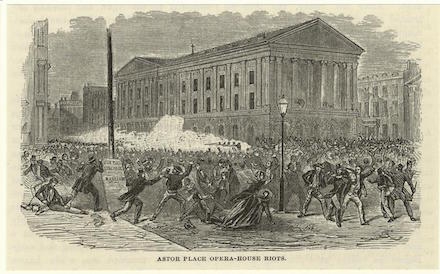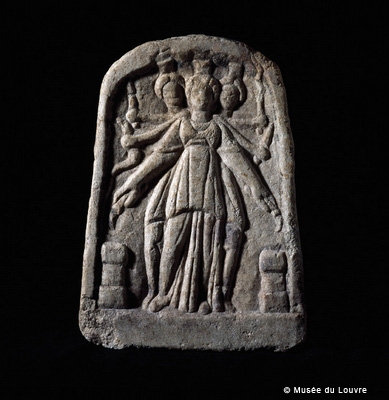
Macbeth
November 4-6 and 11-12 at the Hangar Theatre
Happy Halloween!
Today is the perfect day to talk about "The Scottish Play" and...
Superstition
"Is this a dagger which I see before me...?" (Act 2, Scene 1)
Much of the danger in Macbeth comes from a fear that mysterious powers are exerting influence and ill luck on human affairs. When Shakespeare wrote Macbeth, the witches — with their creepy cauldron ingredients and weird predictions — tapped into a deep vein of superstition perpetuated by the publication of King James's Demonology in 1597.
Whether or not people still believe in witches today, something of Macbeth's own superstition and misfortune have attached to the history of a play many actors only dare to call "The Scottish Play." The curse of Macbeth, allegedly caused by witches, has prompted many rumors — some of them more easily dismissed than others. The claim that the first actor ever to play Lady Macbeth died on opening night is problematic due to uncertainty over both the cast and date of the first production. On the other hand, a dispute about whether English actor W.C. Macready or American actor Edwin Forrest was the better Macbeth, did result in the Astor Place Riots in 1849, which killed more than 20 people and injured 100 more. Macbeth was the inaugural production of the new Covent Garden season in 1809 when riots also broke out. Some say Lincoln was reading Macbeth the night before he was killed...in a theatre!
Reports of injured or dead actors are particularly plentiful, including Laurence Olivier's near miss with a stage weight, Kenneth Branagh's accidental stabbing of an actor in his cast, and the death of Harold Norman, who died from injuries sustained in battle in a 1947 production. The unfortunate use of real swords accounts for many of these injuries, bringing Macbeth's suspicious words "Is this a dagger which I see before me" some ironic weight.
Come and see it — if you dare!
Get tickets now
The Witches
"They have more in them than mortal knowledge..." (Act 1, Scene 5)
While the witches are one of the most striking and memorable aspects of Macbeth, some of the witch scenes in the play were probably not written by Shakespeare at all. They were taken from another play, by Thomas Middleton, and added to Macbeth by Shakespeare's acting company after he had died. They draw heavily on the conventional theatrical stereotypes of Shakespeare's time, giving us witches that are sometimes scary, sometimes silly.
Shakespeare's historical source for the events of the play, Holinshed's Chronicles, gives a different view of the witches. It says that the beings who appeared to Macbeth and Banquo were widely thought to be "the goddesses of destiny." This is in keeping with the way the witches are referred to in the dialogue: they are always called "the weïrd sisters," where "weïrd" comes from the Old English term wyrd, meaning fate or destiny. And the primary power that the witches have in the play is indeed the ability to prophesy about what will happen in the future.
This set of ideas links the witches of the play back to the older, pre-Christian mythological traditions of early Europe. They stand in a line of "goddesses of destiny" such as the Norns of Norse mythology and the Greek Fates. For this production, we've been exploring the possibilities of taking this idea literally and treating our witches as goddesses of destiny, powerful supernatural beings that exist on a different level of reality than the human characters and have "more in them than mortal knowledge."
Along these lines, the goddess Hecate appears as a character the published text of the play, but she is probably part of what was added to the play by other writers. Hecate is invoked at other times in the play, however, and we became intrigued with the possibilities that arose from tracing her back to her roots. In classical mythology, Hecate was a powerful goddess of night, magic, crossroads, etc. An ancient Greek hymn to Hecate goes like this:
Hekate of the Path, I invoke Thee, Lovely Lady of the Triple Crossroads,
Celestial, Chthonian, and Marine One, Lady of the Saffron Robe.
Sepulchral One, celebrating the Mysteries among the Souls of the Dead,
Daughter of Perseus, Lover of Solitude, rejoicing in deer.
Nocturnal One, Lady of the Dogs, invincible Queen.
She of the Cry of the Beast, Ungirt One, having an irresistible Form.
Bullherder, Keeper of the Keys of All the Universe, Mistress,
Guide, Bride, Nurturer of Youths, Mountain Wanderer.
I pray Thee, Maiden, to be present at our hallowed rites of initiation,
Always bestowing Thy graciousness upon the officiant.
Hecate is usually depicted as a triple goddess, with three faces and three bodies, as for example in the carving shown below. Since there are three witches in the play, this led to some interesting possibilities for staging...

Opens Friday — Two Weekends Only!
Get tickets now!
Buy online here, or call the Hangar box office at 607-273-ARTS (2787).
Want to see the show for free? Sign up to be an usher here!
The Ithaca Shakespeare Company · Ithaca, NY 14850 · info@ithacashakespeare.org
